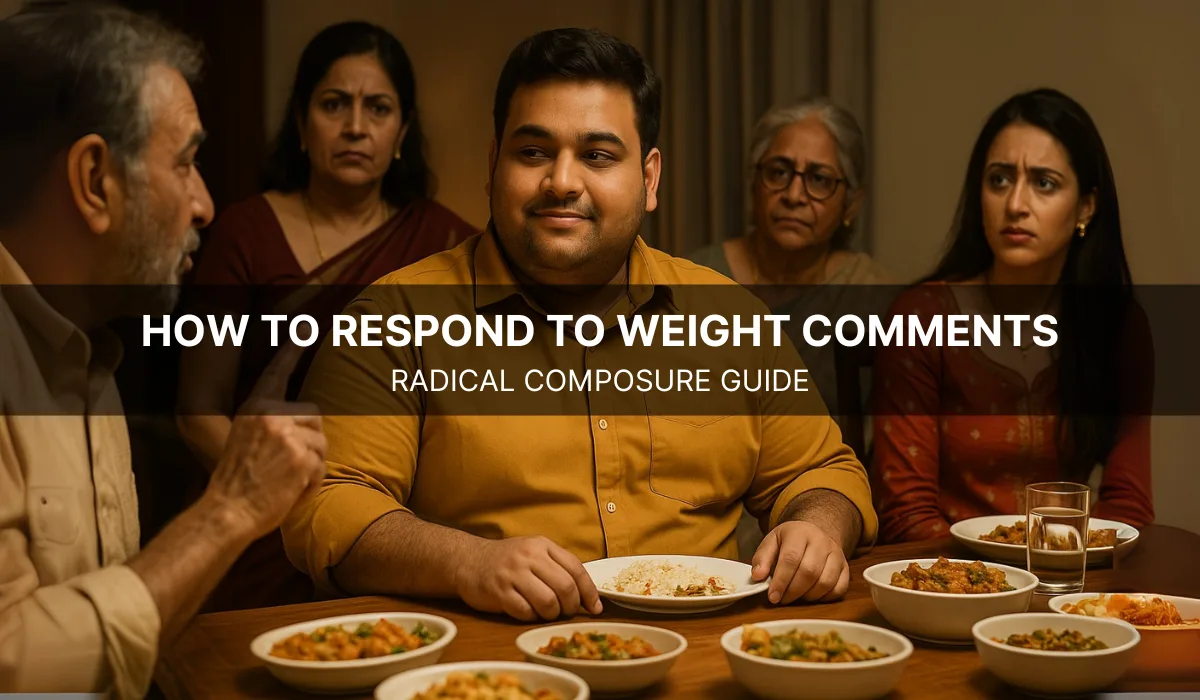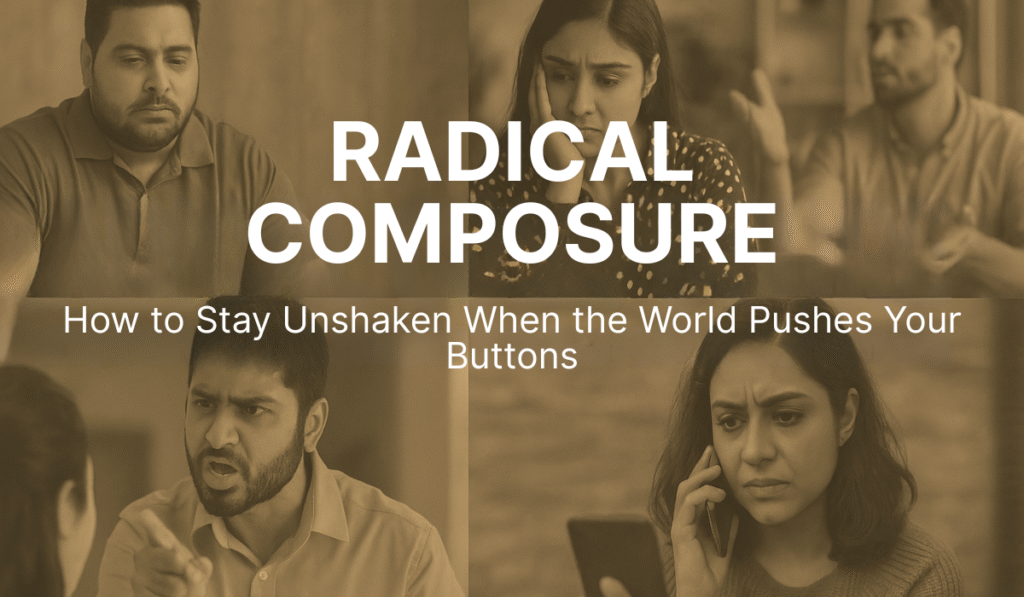When Your Body Overshadows Your Success
“You’ve put on some weight.”
Four casual words. But they sting more than anyone admits.
You’ve built teams. Delivered results. Maybe even created something from scratch.
You’ve sacrificed sleep, stability, and sanity at times — and you made it.
Yet at a family gathering, social event, or office hallway… someone reduces it all to your body:
- “You were thinner last year, right?”
- “You should take care of yourself.”
They see your size, not your strength.
They comment on your appearance, not your progress.
This hurts because it undermines your achievements and brings you back to a surface-level judgment of worth.
But here’s the truth:
You are not here to shrink. You are here to stand.
And this is where Radical Composure comes in — a science-backed framework that helps you handle appearance-based criticism, family body-shaming comments, and weight-related judgment without losing your calm, your clarity, or your dignity.
———-
Why People Comment on Your Weight (Even When It’s None of Their Business)
Most people speak without thinking, but there’s usually a reason behind their words. Understanding this reduces the sting and gives you a sense of leverage.
1. They’re Projecting Their Own Insecurities
Projection is a classic defense mechanism. People often judge what they feel is out of control in themselves.
Weight is a common projection point, especially in appearance-obsessed cultures.
Their comments are rarely about you. They’re about them.
2. They’re Operating from Surface-Level Thinking
Attribution Theory (Heider, 1958) explains that humans often judge others using the most visible traits.
Weight becomes an easy — but inaccurate — shortcut for assumptions about health, discipline, or success.
It’s lazy thinking, wrapped in outdated conditioning.
3. They’re Conditioned by Cultural and Generational Bias
In many cultures, thinness is equated with success and self-control. These beliefs are passed down, rarely questioned, and often weaponized.
So even when you’re thriving, they cut you down by aiming at the most visible target: your body.
———————————-
Why Weight Comments Hurt So Much
When someone remarks on your appearance, it doesn’t just annoy you. It activates your nervous system and your sense of identity.
You Might Feel:
- Embarrassed or exposed
- Angry but unable to express it
- Defensive or self-doubting
- Diminished despite your achievements
Why It Feels Personal
Polyvagal Theory (Porges, 2011) shows that our nervous system interprets social judgment as a threat. That’s why you might freeze, lash out, or retreat when someone comments on your weight.
Over time, repeated criticism erodes self-trust — especially when it comes from people you thought should know better.
——————–
Radical Composure: How to Stay Calm When Judged for Your Appearance
It isn’t about ignoring your feelings. It’s about owning your emotions, then choosing how to use them.
Here’s your 5-step tactical playbook for staying calm when someone judges your weight.
1. Pre-Arm Your Identity
Before entering triggering spaces (family dinners, weddings, reunions), remind yourself:
- “My worth isn’t up for discussion.”
- “Their opinion doesn’t define me.”
- “I’ve earned the right to be here, exactly as I am.”
This is cognitive reframing (Beck, 1979) — a proven tool to shift emotional responses before triggers take hold.
2. Pause and Breathe Instead of Reacting
When the comment lands, take 2–3 seconds before responding.
This pause activates your prefrontal cortex (decision-making) instead of your reactive limbic system.
This is called response inhibition — and it gives you control over how the moment unfolds.
3. Respond with Precision (or Powerfully Ignore)
You don’t need to debate your body. Choose your response path:
Redirection:
- “Let’s talk about something more meaningful.”
- “There’s a lot more going on in my life than my weight.”
Assertion:
- “That comment isn’t helpful.”
- “I don’t discuss my body. Let’s move on.”
Silence:
A blank stare or polite smile can be more powerful than a 10-minute defense.
Marcus Aurelius once said, “You always have the option of having no opinion.” That option? Pure power.
4. Exit the Moment Without Carrying It
Don’t replay the comment in your head all night. That only gives it more power.
Take a walk. Journal. Call a friend. Release the charge. Don’t internalize it.
5. Anchor in Purpose, Not Emotion
Ask yourself:
“What outcome do I want in 5 years — not 5 minutes?”
This shifts your energy instantly. Responding with long-term purpose, not short-term emotion, keeps you unshakable.
———————————
Micro-Action You Can Try Today
Before your next high-pressure social interaction, write down:
Three things you’re proud of that have nothing to do with appearance.
Examples:
- “I led a product launch that saved the company.”
- “I supported a friend through depression.”
- “I’m thriving in my career despite health challenges.”
Let these truths walk into the room with you — not their opinions, not your weight.
———————————
You Are More Than a Comment
Your body is not a public conversation.
Your weight is not a measure of your wisdom, your work, or your worth.
When people judge your appearance — whether through family body-shaming comments, colleagues’ digs, or cultural expectations — it’s rarely about you.
Radical Composure is your armor.
It helps you:
- Stay calm under pressure.
- Respond (or not) with precision.
- Protect your peace and keep moving.
Your body is not an open forum.
Your worth is not up for discussion.
Radical Composure makes sure it never will be.
“Tired of body-shaming stealing your peace?
Book your free Radical Composure Discovery Call today and learn how to handle weight-related judgments with calm, clarity, and confidence.
👉 Book Your Free Session Here“
📌 Blog Summary
This blog unpacks why weight-related comments sting — even when you’re thriving in your career, relationships, or personal life. It highlights the psychological and cultural roots of body-shaming, explains why such remarks feel so personal, and introduces Radical Composure — a science-backed framework to help you respond with calm and dignity.
Through a 5-step playbook, readers learn how to:
- Reframe identity before entering triggering environments
- Pause and breathe to prevent reactive outbursts
- Choose between redirection, assertion, or silence
- Release the emotional charge after the encounter
- Anchor themselves in long-term purpose, not short-term emotion
The key takeaway: Your weight is not up for discussion. Radical Composure ensures your worth stays untouchable.
❓ FAQs
Q1: Why do people comment on weight even when it’s irrelevant?
Often, it’s a projection of their own insecurities, lazy surface-level judgments, or generational conditioning about appearance.
Q2: Why do weight-related remarks hurt so deeply?
Social judgment activates our nervous system (Polyvagal Theory). It feels like a threat, triggering shame, anger, or defensiveness.
Q3: How can I respond in the moment without losing my calm?
Use Radical Composure techniques: pause, breathe, and choose between redirecting the conversation, asserting boundaries, or using silence.
Q4: What if I can’t stop thinking about the comment later?
Practice emotional release — journaling, walking, or calling a friend. Don’t replay the remark; release it instead.
Q5: How can I prepare myself before entering situations where comments might come up?
Pre-arm your identity by reminding yourself: “My worth isn’t up for discussion. Their opinion doesn’t define me.” Carry achievements unrelated to appearance as your armor.
Q6: What exactly is Radical Composure?
It’s a research-backed framework for staying calm, confident, and in control when judged for your body. It helps you protect your peace while choosing responses that serve your long-term purpose.



